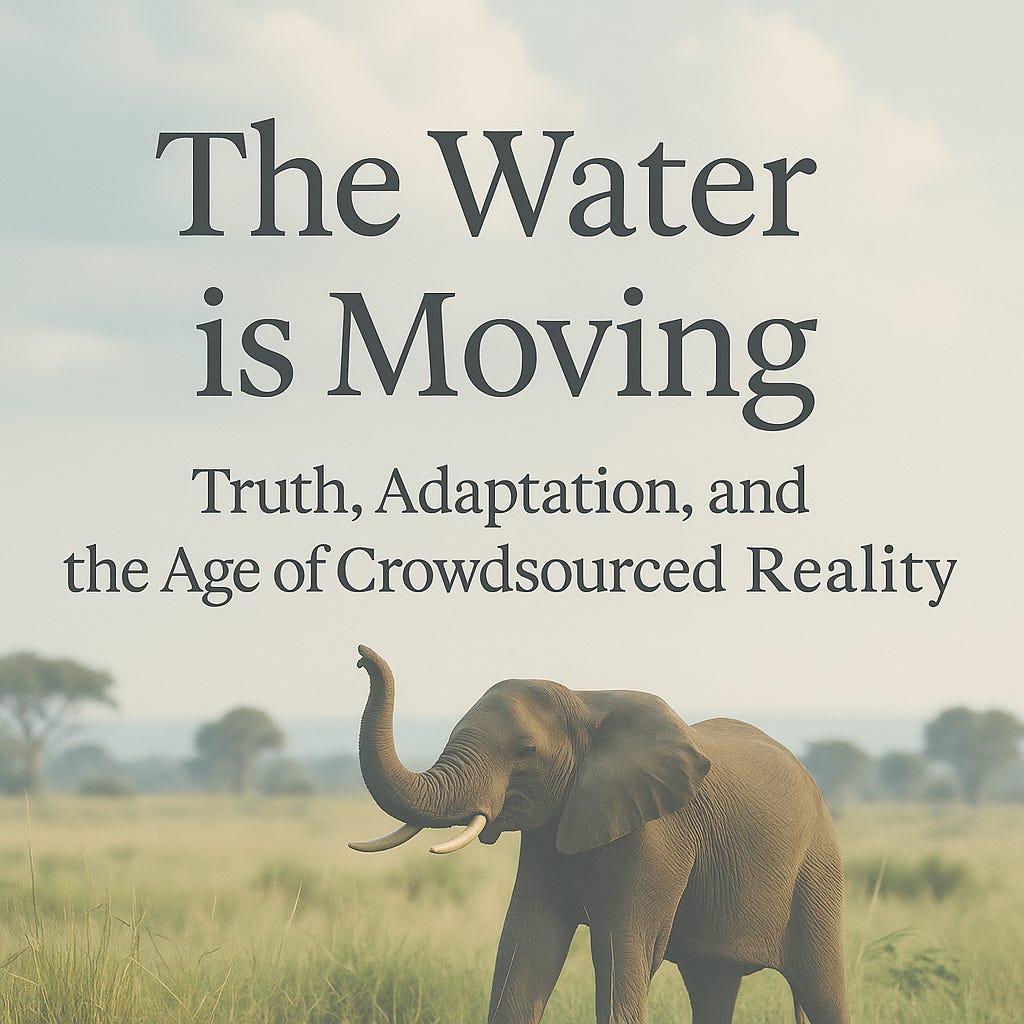The Water is Moving: Truth, Adaptation, and the Age of Crowdsourced Reality
In the natural world, survival begins with sensing change.
When the water disappears, herds move. When the landscape shifts, instincts guide a new course. But in today’s hyper-connected human world, many of us are losing that ancient instinct. We’re surrounded by change—climate, technology, social norms, economic uncertainty—and yet we remain oddly still, anchored by belief instead of behavior.
This isn’t just a cultural issue. It’s a survival one.
The Rise of Crowdsourced Reality
In our current information landscape, truth often loses ground to what’s most shared, liked, or affirmed by our chosen networks. Social media has democratized communication, offered new voices a platform, and fueled rapid mobilization during crises—but it has also accelerated misinformation, tribalism, and emotional reinforcement over accuracy.
What trends isn’t always what’s true. And what’s true doesn’t always trend.
In this environment, reality can become more about consensus than evidence—especially when consensus is driven by popularity, not process.
The Elephants Knew to Move
In 2021, a herd of wild Asian elephants in China left their nature reserve and traveled over 300 miles. The cause? Environmental disruption. Likely driven by diminishing food or water, they responded instinctively to the variables at play. They walked through towns and cities, crossed rivers and highways. And eventually—faced with unfamiliar dangers—they turned back.
They moved because they sensed the conditions had changed.
They adjusted when the new terrain proved unlivable.
Even elephants, with no social networks or algorithms, knew the water was moving.
Now Enter: The AI Epoch
We now live in a world reshaped by artificial intelligence. AI can process massive datasets, identify patterns we can’t see, and amplify narratives at unprecedented scale. But it cannot understand meaning. It has no ethics, no memory of harm, no sense of consequence.
It is not a prophet. It is a mirror.
When AI is trained on biased data or misleading narratives, it reproduces and spreads those distortions—sometimes invisibly. From deepfakes to algorithmic echo chambers, we’re witnessing the rise of synthetic influence. But the tool itself is not the enemy. The danger lies in uncritical use and blind trust.
AI can help us see the world more clearly—but only if we ask it better questions.
The Adaptation Instinct is Dormant, Not Dead
Adaptation has always required more than intelligence. It requires humility.
It’s not enough to gather information. We must be willing to act on it. To step away from the familiar when it no longer serves us. To unlearn old patterns. To face reality—especially when it’s inconvenient.
The elephants moved without needing to be right.
They moved because survival depended on response, not opinion.
So What Can We Do?
We don’t always get to choose the changes we live through. But we can choose how we meet them.
Here are a few starting points for rekindling our adaptive instincts:
Pause before sharing. Ask: Is this true—or just resonant?
Seek out diverse sources. Especially the ones that challenge your assumptions.
Use AI to explore, not just confirm. Ask your tools what you might be missing.
Stay curious in discomfort. It’s often the first sign of growth.
Reflect communally. Join others committed to truth and transformation, not just survival.
The water is moving.
We don’t need to fear it.
We need to learn how to flow with it—together.
As we begin this exploration, I invite you to pause and reflect:
What truths are shifting around you? What instincts are asking to be remembered?
This is just the beginning of a larger conversation.
In our upcoming thought series, we’ll dive deeper into how we reconnect with truth, relearn the practice of adaptation, and navigate the AI-driven world with intention and integrity.
Stay tuned.







